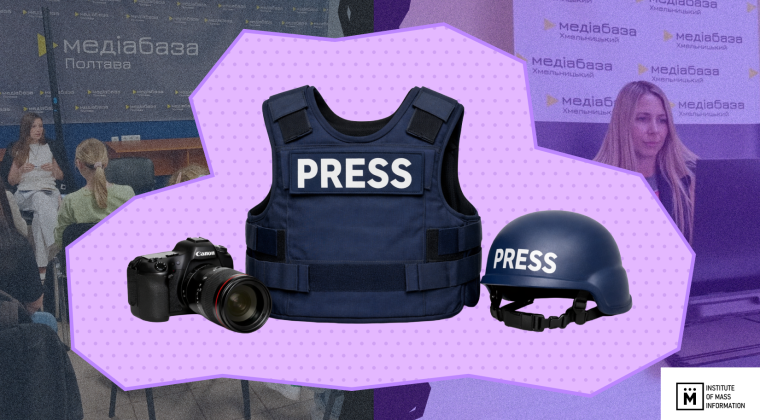People in the temporarily occupied parts of Zaporizhia oblast have been living under the influence of the occupiers’ propaganda and their media for almost three years. “Reconstruction. Zaporizhzhia” spoke with Natalia Vyhovska, the representative of the NGO “Institute of Mass Information” in Zaporizhzhia oblast, about the occupiers’ methods of spreading information in the occupied territories and whether their propaganda is effective.
What propaganda tools the occupiers use in the Zaporizhzhia TOT
“You review and analyze troves of content by the Russian and pro-occupation media. How would you describe this content in a few sentences?”
“It is all complete nonsense, overloaded with lies and historical confidence in what they say. It is a constant feeling of entering an alternative reality. And if you stay there for a long time, it starts to drag you in.”
“What channels and tools do the Russians use to spread propaganda?”
“The key tool is the network of dormant Telegram channels which became active immediately after the start of the full-scale invasion and after our territories, among others, were occupied. It is a very powerful influence tool. There is also the holding ZaMedia, which covers radio, television, a newspaper, and a website.
“The occupiers print 100,000 copies of the free-of-charge newspaper ‘Zaporozhsky Vestnik’ every week. ‘Komsomolska Pravda’ is being actively distributed, it is like a special issue for the Zaporizhzhia TOT. There are also various minor publications and 14 radio frequencies.”
“Apart from mass media, how else do the occupiers promote their narratives? Who are they trying to influence most, young people or middle-aged people and the elderly?”
“The occupiers use whichever channels they can access. For example, they have a bunch of dedicated pages on the social network Vkontakte, groups in Telegram and Viber, because these are some of the apps allowed in the occupied territories. There is also a serious strategy in development to propagandize to schoolchildren. In the first year these were mostly standalone events, but now this whole propagandistic concept of Russian school education is being introduced in the temporarily occupied territories, too. This is a very aggressive strategy that has to do with the ‘patriotic’ upbringing of children, with subjects from the USSR times such as ‘Labor’ and ‘Civil defense’ making a comeback.
“A separate point of focus is the students, that is, the youth. It is they who form the movement ‘Yug Molodoy’. It receives a lot of money from federal budgets as grants from the Rosmolodezh, Putin’s foundation for developing cultural initiatives. This is only what’s in the open. It is clear that the occupying power also allocates money for this from local budgets. The sums are quite large.
“Overall, elderly people are being influenced through traditional media. Young people are being ‘indoctrinated’ through activities and events that say ‘look how cool we are’. And schoolchildren are simply being ‘rewired’ through Russian-style education. That is, the occupiers influence absolutely all categories of the population.”
Is the occupiers’ propaganda in the TOT effective?
“How effective is Russian propaganda overall?”
“Russian propaganda is very effective. There is a simple law in psychology: if you stay in a destructive relationship for half a year, your psyche starts to deform. If Ukrainians stay under Russia’s destructive influence (and it is by all means destructive) for over 2 years, deformation will definitely be happening.
“Even completely pro-Ukrainian, reasonable people with critical thinking who live in the TOT sometimes cannot tell the truth from fake news, because they have no access to channels of information except those permitted by the Russian censorship. And when they live continuously in a distorted world, in the distorted reality constructed by the occupiers, with propaganda shoved onto them, it is very difficult to stay in touch with reality. Half a year into the full-scale war, I said that we underestimated Russian propaganda. I considered myself an expert who knows what hate speech is, but I was not prepared for what happened. And now I understand that it was a very well thought-out offensive strategy in the media space. It was a separate war that has been waged for years. And we were not always prepared for it at all.”
“How long can it take to clear a mind of the Russian garbage?”
“I don’t know. No one knows, probably. I assume that those people who retained their pro-Ukrainian views will have to recover from post-traumatic stress disorder. And what do we do with those whom the Russians managed to ‘rewire’, I don’t know. But I can certainly say that every day of occupation is an act of intense pressure and violence against everyone who lives there. Because what the Russians are doing through informational abuse simply goes against humanity, against any laws of humanity, against the basic laws of ethics. My observation is that all Russia’s propaganda is aimed at dehumanizing Ukrainians who live under occupation.”
What happened to the Ukrainian media in the occupied territories of Zaporizhzhia oblast
“What happened to the Zaporizhzhia oblast media that used to work in the now-occupied places? What share of them shut down, what share was appropriated by the Russians, and what share relocated and works elsewhere?”
“Shutting down and being appropriated are parallel processes. For example, the huge Melitopol holding ‘MV’ – they did shut down, but when they left, the Russians took over all their assets. There are media outlets that closed down and were appropriated anyway. Everything that was in Enerhodar and Tokmak has been destroyed.
“The ones that relocated and kept working from Ukraine-controlled territories include ‘Prymorka City’ and ‘RIA Pivden’ (‘RIA Melitopol’, they kept working even under occupation until they couldn’t anymore, and suffered more than the rest, because the administrators and journalists are now detained). That is, about 7% of the media relocated and continued their work. And that may even be too generous.”
“Have you researched how people in the TOT can get reliable information about Ukraine?”
“All of us, who are in the occupier-free territory, have no idea what pressure and risk the people who still support Ukraine, who believe that our lands will be liberated, face. A person can just be walking down the street, and their phone will be taken away and checked, and they have Signal, VPN, or Telegram with subscriptions to pro-Ukrainian channels, then they may end up in a torture cellar very quickly. These restrictions can be bypassed: by removing the Russian SIM card, connecting to Wi-Fi via VPN, and then accessing the resources you want. But the question is how many people know about this method, know how to do it and can use it while in constant danger.
“The Institute of mass information representative in Luhansk oblast, Valentyna Troyan, has analyzed why regional media outlets keep their Telegram channels. One of the interviewed editors said that this was the only channel for delivering information to the occupied territories. That is, Telegram works both ways: it is a Russian app with Russian servers, and on the other hand, it is allowed in the TOT and people there can use it to access information.”
“How do people stay informed in the frontline areas?”
“I have not studied this issue, but I can definitely say that the frontline areas’ problems with accessing information are purely technical problems. That is, if there is no power, there is no Internet; if the Internet blacked out during shelling, you have to use the radio. That is, there are more chances to get information in the unoccupied territories.”
“Can you give any advice on how to distinguish a propaganda fake from authentic information? Where is the best place to find information for people in the TOT?”
“As for the TOT, I have no moral right to recommend anything to the people who live there. Except for one point: all the Russian and pro-occupation media are lying. They all lie about the Ukrainian context, the battlefield developments, the social issues. But then the question arises: what do people in the TOT have to rely on? If someone is willing to take the risk and use a VPN, they may be accessing normal information. If not, then they should only use the information that they need right now to survive: official announcements, new regulations introduced by the occupiers. People just need to stay alive at any cost and not lose faith that there are still those who remember them and are trying to do something to reunite Ukraine.”
This article is supported by the Partnership Fund for a Resilient Ukraine, which is funded by the governments of the United Kingdom, Canada, the Netherlands, the United States of America, Finland, Switzerland, and Sweden. The content of this article is the sole responsibility of the media outlet “Reconstruction. Zaporizhzhia” and does not necessarily reflect the views of the Fund and/or its financial partners.



